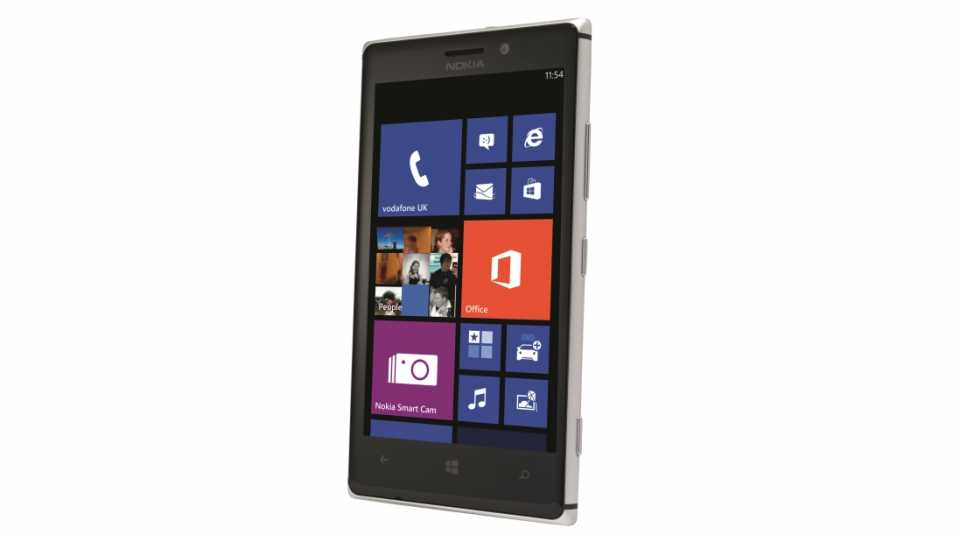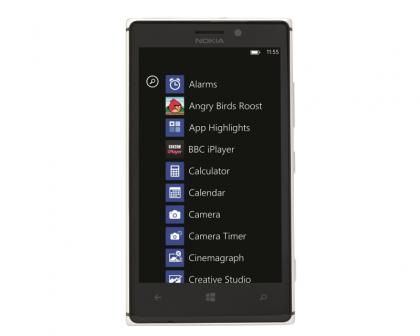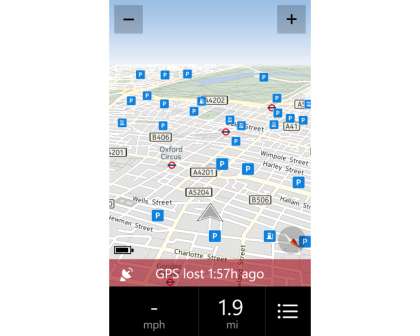Nokia's flagship Lumia phones have always been things of beauty. The Lumia 920 had a gorgeous, if slightly heavy, unibody chassis, and its successor, the Lumia 925 was even lighter and slimmer, shaving 46g off the 920's 185g weight as well as 2mm in thickness, making it a much more svelte proposition.

While both phones have been since been replaced by the equally stunning Lumia 930 , the Lumia 925 is still a decent alternative if you don't want to fork out an extra £100 SIM-free for Nokia's latest and greatest. Even better, the Lumia 925 has now been upgraded to Windows Phone 8.1 and will be getting Windows 10 once it arrives later this year, giving it all the same features as the more expensive Lumia 930.
DESIGN & DISPLAY
Like the Lumia 920, the 925 is a sealed unit, but the design is significantly different. Instead of a solid polycarbonate shell, the phone's chassis is split into a coloured plastic rear and metal frame. We're not sure it feels as absolutely bombproof as the Lumia 920, but we're certainly fans of the metal frame; it's cool to the touch and makes the 925 more comfortable to hold for long periods than a phone with a plastic chassis.
The Lumia 925 has a 4.5in AMOLED display with a 768x1,280 resolution. This isn’t up there with the 1,080x1,920 Full HD screens we’ve become used to seeing on top-end handsets such as the Sony Xperia Z and Samsung Galaxy S4 , but it's an adequate number of pixels for the 925's slightly smaller screen. That's 332 pixels per inch (PPI), compared to 441PPI on the S4 or 326PPI on the iPhone 5.

It's not Full HD, but this is still an excellent display
The display has excellent image quality. As we normally see from AMOLED screens, blacks are properly black, and colours are beautifully saturated and vibrant. Side by side with a Samsung Galaxy S4, the Lumia 925 had whiter whites and more saturated colours, but couldn't match the S4 for viewing angles; tilting the screen away from vertical led to a slight blue cast on the 925's display. However, most people tend to use their phones straight on, so we can't see this being much of a problem.
Like the 920, the 925 has a dual-core 1.5GHz processor and 1GB RAM. This is more than adequate for running Windows Phone 8, and everything is beautifully smooth. The phone completed the Sunspider JavaScript benchmark in 906ms, which is the fastest score we’ve seen, and renders complicated websites quickly.
Initially, we weren't particularly keen on the browser, as Windows Phone 8's version of Internet Explorer didn't have its own dedicated back buttons (unlike iOS and Android). Instead, you had to use the phone's generic back button to go back to previous pages. This was fine when you had the browser open, but if you went back to the main menu and then opened IE again, it would go to the last page you visited, but wouldn't allow you to go back to the previous page. Thankfully, Windows Phone 8.1 fixes this problem, bringing it more up to date with its rival operating systems.

HERE Navigation gives you turn-by-turn navigation with both offline maps and search
APPS
The number of apps has also been rapidly improving, as there's now a much wider selection of all your favourite services than when the Lumia 925 first launched. As well as Netflix, BBC iPlayer, ITV Player, 4OD, Demand 5, Spotify, DropBox and TripAdvisor, Nokia also sweetens the deal with its own suite of useful apps. These include HERE Navigation, which gives you turn-by-turn navigation and, unlike Google Navigation, supports both offline maps and offline address searches, and Nokia Music, a large collection of free music playlists which can be streamed and listened to offline.
There were a couple of apps we hadn’t seen before. Photobeamer is intriguing. This is a quick way to view photos stored on your phone in another device's web browser, without having to plug the phone in or sync with an online service. You load the app on your phone, go to www.photobeamer.com on the other device then scan the QR code presented on screen. Your photo will then appear in the other device's browser, and as you flick through the photos on your screen they also flick past in your browser. It's a very neat trick and a great way to show your photos on a bigger screen.
CAMERA
It's also the first time we've come across Nokia's Smart Cam app. This takes a sequence of photos every time you take a picture. You can then use this sequence to perform a number of fancy operations in the app. You can pick the best shot from the sequence (the phone picks what it thinks is the finest image automatically) and find faces, but the Action Shot and Remove Objects functions are particularly interesting.
Action Shot is for taking photos of people moving past the camera, such as a skateboarder, skier or a Beatles tribute at the Abbey Road crossing. It superimposes the sequence of images one on top of another, so depicting the subject's entire movement across the frame. You can toggle the option to make the images gradually fade out as they go back in time, for added artistic effect.

Use Action Shot to capture high-octane sports such as Office Walking
Remove Objects detects moving objects in an image, then gives you the option to remove them; as Smart Cam takes several photos of the same scene, it has enough information to fill in the background seamlessly. We found it particularly useful for removing cars, cyclists or people straying into shot.
We liked the Smart Camera features, but weren't blown away by the basic image quality from the 8.7-megapixel camera. Low-light images were reasonable, if not up there with the HTC One 's, but daylight images from the standard camera were decidedly odd. Photos seemed over-processed, with overblown highlights and a turquoise rather than blue sky. It looked like excessive use of HDR, but we couldn’t find an HDR option to turn off.
Sunlight photos seem overblown and unnatural, and the sky definitely wasn't that colour
Photos taken with the Smart Cam app were better, with less wacky colours, but we found details were smudgy. It's far from the best camera we've seen; the Sony Xperia Z and HTC One 's are significantly better for outdoor and indoor shots, respectively.
The Galaxy S4 (left) captures much more detail than the Lumia 925 (right)
CONCLUSION
When the Lumia 925 launched nearly a year ago, it was the best Windows Phone 8 handset around. Now widely available for around half its launch price (£240, down from £500) it's still a fantastic phone and a real bargain particularly since it's now available with Windows Phone 8.1 and will be getting a free upgrade to Windows 10 later this year.
While the Lumia 930 is now a vastly superior handset with its bigger, better screen, better camera and much faster processor, it does cost around £100 more SIM-free. However, contract prices for the two phones are still roughly the same price, which makes the Lumia 930 much better value over the course of two years. If you're looking to buy SIM-free, though, then the Lumia 925 is a great choice and will leave you with a much happier bank balance.
|
Details |
|
Price |
£500 |
|
Rating |
***** |
|
Hardware |
|
Main display size |
4.5in |
|
Native resolution |
768x1,280 |
|
CCD effective megapixels |
8.7-megapixel |
|
GPS |
yes |
|
Internal memory |
32768MB |
|
Memory card support |
none |
|
Memory card included |
0MB |
|
Operating frequencies |
GSM 850/900/1800/1900 |
|
Wireless data |
HSDPA |
|
Size |
129x71x9mm |
|
Weight |
139g |
|
Features |
|
Operating system |
Windows Phone 8 |
|
Microsoft Office compatibility |
Word, Excel, PowerPoint |
|
FM Radio |
yes |
|
Accessories |
headphones, USB cable, charger |
|
Talk time |
18 hours |
|
Standby time |
18 days |
|
Buying Information |
|
SIM-free price |
£500 |
|
Price on contract |
0 |
|
SIM-free supplier |
www.expansys.com |
|
Contract/prepay supplier |
www.mobilephonesdirect.co.uk |
|
Details |
www.nokia.co.uk |
